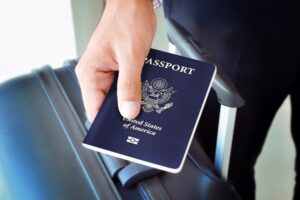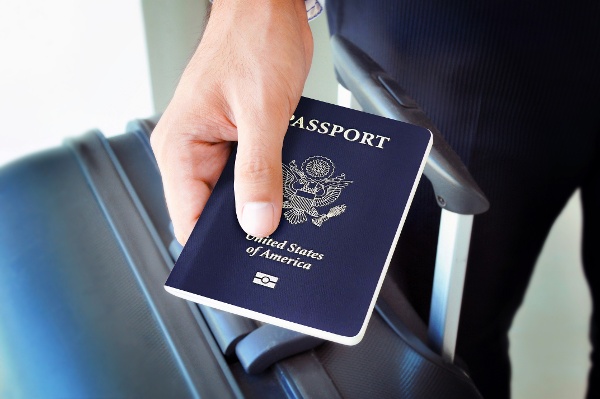Traveling for a trade show can be a stressful experience. You are worried about flight delays, getting your shipment on-time, enduring long days on your feet during the installation and show run, and working evenings to evaluate and assign leads. Rarely is there enough time to see the sights and enjoy the local area. These issues are magnified when you’re exhibiting internationally because things can be SO different: from food and etiquette to language and legal, to health and safety concerns. But there are some guidelines that can help you avoid some of the most common pitfalls.
Jeff Hannah is the VP of International, Interiors and Creative for Exhibit Concepts. Jeff has led multicultural teams in the strategic development of complex projects in over 50 countries for many of the world’s top brands, making him a seasoned and experienced traveler. He has several do’s and don’ts to keep you prepared, safe, and ready to represent your company with class.
1. Don’t wait to get your passport and visa! As you’re applying, allow enough time for processing.

Having an up-to-date passport can make or break your travel. If you do not have a valid passport, you won’t be able to board the plane, as it is mandatory to have for most countries (except some U.S. territories). Some countries also require a valid entry visa to visit, specifically if you plan to stay beyond 90 days. In some cases, the visa is required outright. Travel visas are not credit cards; they are an endorsement within your passport which grants you official permission to enter, leave or stay in a country for a specified period of time.
If the country you’re visiting requires a visa, receiving the document stamped and ready to go will take weeks. The visa process may require other supporting documents, such as an official invitation letter from someone within the country you are visiting. If you’re applying for a visa, the process, requirements, and applications will vary by destination. Do your due diligence to research everything that is needed and the anticipated processing times.
Do allow at least 4-6 weeks to obtain a first-time passport or if renewing, apply to renew at least 9 months prior to the expiration. If you’re applying for a passport for the first time, you will need to fill out a DS-11 form, collect support documents such as identification and a birth certificate, get a 2” by 2” color passport photo taken, prepare your fees and submit the application. Passport applications must be scheduled for submission with an approved passport agency or post office. Passport renewal requires a DS-82 form and the same supporting documents, photo, fees, and your most recent passport. You will also need to schedule an appointment with an appropriate agency for submission.
All supporting documents will be mailed back to you with your new passport. Most countries require you to have at least 90 days (or more) remaining on your passport prior to its expiration date; you don’t want your passport to expire while you are traveling overseas, as it then becomes invalid. In special circumstances, it’s possible to expedite the process.
2. Don’t book your flights through separate airline carriers.
For many international destinations, you will have a layover somewhere and change planes. But booking your flights through separate carriers can cause a ton of unnecessary stress and problems during your journey. If you miss your connection, you’ll have to pay fees to re-book in addition to being late upon arrival. Also, your luggage will not be automatically transferred to your connecting flight, which increases your risk of losing your belongings. There’s nothing worse than arriving at your destination with just the clothes on your back. Speaking of which, it is always a good idea to make sure you have your medications, documentation, light toiletries and a change of clothes in your carry-on luggage just in case!
Do book your flights with a single airline carrier.
You will save yourself a lot of pain if you book your flights through one airline carrier. If anything happens on your journey such as a flight cancellation or delay, the airline will likely issue you travel and hotel vouchers at no expense to you. Plus, your luggage is accounted for and the risk of losing it significantly decreases.
3. Speaking of luggage, don’t pack without a plan.
When flying overseas, if you forget something, it may be difficult to find or expensive to purchase what you’ve missed. When packing clothing, it’s also important to familiarize yourself with the attire expected at the event you will be attending, as well as the cultural expectations.
Do research on the attire or items you will need to bring and make a checklist.
Make sure that you familiarize yourself with the climate of the country you’re visiting as well as the type of attire expected at the show. It’s always a good idea to pack conservative business attire, as most oversea shows are more formal than those in the US. If you’re traveling in the Middle East, expected attire is more traditional than many other countries and it is best to err on the side of caution.
Clothing isn’t the only thing to think about. Make sure you’ve packed all the necessary medications, toiletries and electronics you may need during your journey. For electronics, determine what type of travel adapter, converter or transformer you may need, as electrical outlets and voltages are usually different from what we’re accustomed to in the US. You will need the right kind of adapter or converter in order to use the device. With the wrong voltage, you can easily and instantly destroy your device!
After you’ve made your checklist and packed everything that you need, make sure that you can manage your luggage. There may be times you have to carry EVERYTHING all at once – like when you are boarding trains. Weigh your luggage and make sure that it is less than 50-70lbs, as you may be charged for oversized bags. If you’ve packed too much, consider downsizing and switching larger items such as your toiletries to travel size to reduce weight and save space.
4. Don’t select your housing just based on cost or rating.
Remember: research, research, research! Before you select where you will stay, consider the proximity of your lodging to the venue, the area of town, ratings, price, amenities and services, any stay minimums and what locals recommend. Depending on the length of your stay and location, there are many options for lodging such as international chain hotels, boutique hotels, local hotels, hostels and Airbnbs. If you’re staying in a “developing country”, book only 4-star, westernized hotels because they’re safer and will have expected amenities.
Do your research on the location and book early.
Doing the work to familiarize with the area you’ll be staying, getting recommendations from locals, and booking early will bring you peace of mind. If possible, book your stay one year in advance.
5. Don’t assume laws and risks are the same as they are in the US.
Once you’ve left the US, you’re no longer fully protected by U.S. laws and security. It is critical that you pay attention to and abide by the local laws and conventions.
Do pay close attention to US State Department Travel Alerts and Warnings and research the laws and regulations to assure you’re abiding.
Warnings and alerts will give you information about any dangers in the country you’re visiting. Alerts are organized into four different levels, from low to high. A travel warning may include brief descriptors such as unstable government, civil war, ongoing intense crime or violence or frequent terrorist attacks. Travel alerts may include information such as election season prone to strikes, demonstrations or disturbances; a health alert like an outbreak of H1N1 or evidence of an elevated risk of terrorist attacks.
Reviewing alerts prior to travel will help you prepare or decide whether to attend the show. In countries experiencing civil unrest, severe disease outbreaks, or terrorism, avoiding travel may be the better option. You can sign-up for the Smart Traveler Enrollment Program, which will send you important information from the US Embassy about the safety conditions of your destination.
Familiarize yourself with the laws and regulations by doing online research, contacting local tourism agencies or your threat assessment consultant for more information. Another option is to consult with a threat assessment expert, especially if you are planning major events or handling travel for an executive team or corporate group. These experts continually monitor chatter and threats and can plan for safety, provide security, and mitigate risks.

6. Stay in contact with family or coworkers while overseas.
Depending on where you’re traveling, toll-free numbers may not work or will not be toll free. Without an international phone plan, your calls or text messages will incur hefty charges from your cellphone provider.
Before you leave, do record any direct-dial numbers you might need while on your journey.
Some companies also provide business phones for travel. If your company does, consider asking about their options for an international plan if you’re required to communicate with your company’s home base. If not, you’ll want to contact your cellphone provider to discuss international plan options.
7. Don’t leave home without a contingency plan.
More than likely, you’ll arrive to your destination safely, your event will run smoothly, and you’ll return home just as safe as you did when you left. However, don’t rule out the possibility of something going wrong.
Do make sure that you have two copies of your passports, an emergency contact list, and contact information for the local US Embassy or Consulate. When providing your emergency contact, list key information such as: where you’re going, including any layovers, flight times, and where you will be staying. For passports, make sure you have one copy to keep with you and one to leave at the office or provide to a family member. If your destination has any active threats or warnings, having the local US Embassy or Consulate contact information will allow you to notify them you’ve arrived at your destination.
8. Don’t leave without proper insurance and proof.
As stated before, it’s likely your trip will be without incident. But if you become very ill or worse when overseas, medical care or being evacuated back to the U.S. is a severe expense you won’t want to incur. In foreign countries, it’s more than likely that your standard insurance won’t be honored.
 To prevent a bad situation, do purchase travel insurance and carry the proof with you. You might consider international workman’s compensation, international medical, or even kidnapping/extortion insurance.
To prevent a bad situation, do purchase travel insurance and carry the proof with you. You might consider international workman’s compensation, international medical, or even kidnapping/extortion insurance.
While your engagements, booth installation, the meetings and leads you’ll acquire are important, your priority when you attend an international trade show is YOU! Without your well-being and safety in check, how will the show go on? Before you board the flight, make sure you have a solid plan, a checklist of all the items or documents you’ll need, and have researched the country you’ll be visiting.
Even if you’re not attending a trade show, many of these rules still apply. Stay safe out there and remember to have fun and take-in these memorable experiences!
Looking for more insights from Jeff Hannah? Visit his blog at globalexhibitor.com.










